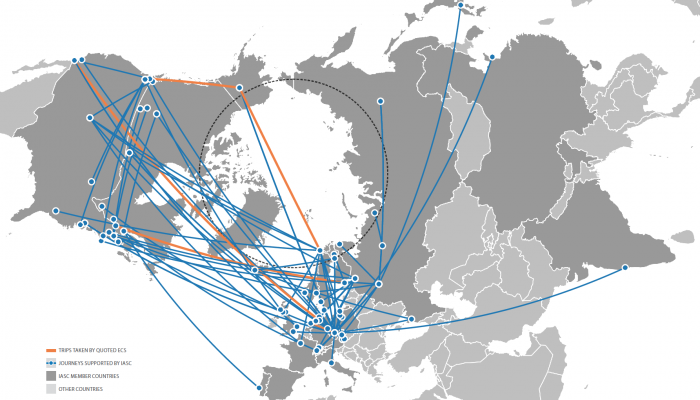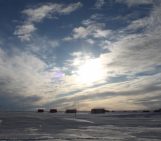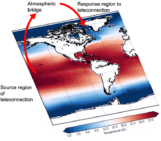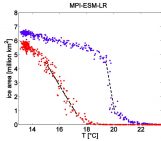
The Arctic is one of the fastest changing regions on the Earth, where climate change impacts are felt both earlier and more strongly than elsewhere in the world. As an integral part of the Earth system, the Arctic is shaped by global processes, and in turn, Arctic processes influence the living conditions of hundreds of millions of people at lower latitudes. No one country or community can understand the Arctic alone. Big Arctic science questions require ambitious Arctic science – but researchers sometimes need a little help bridging both national and disciplinary boundaries. That‘s a lofty mission, but how does the International Arctic Science Committee (IASC) achieve it? Read on!
How does IASC support science?
Each IASC member country appoints up to two members to each of IASC’s 5 scientific Working Groups (Atmosphere, Cryosphere, Marine, Social & Human, and Terrestrial). These groups allocate IASC‘s scientific funds for small meetings, workshops, and projects. Follow the to see the science priorities of each group, find out about upcoming Working Group activities, and explore the expertise of their members!
Understanding the future of the Arctic means we need to invest in the Arctic researchers of today. Therefore, At least 40% of IASC’s working group funds must be co-spent with another working group, to encourage interdisciplinary projects. Check out upcoming events in 2019 like the Year Of Polar Prediction Arctic Science Workshop, High Latitude Dust Workshop, Snow Science Workshop, and Network on Arctic Glaciology meeting – just to name a few!
What else does IASC do?
IASC convenes the annual Arctic Science Summit Week (ASSW), which provides the opportunity for coordination, cooperation and collaboration between the various scientific organizations involved in Arctic research and to economize on travel and time. In addition to IASC meetings, ASSW is a great opportunity to host Arctic science meetings and workshops. ASSW2019 will be in Arkhangelsk, Russia.
IASC influences international Arctic policymakers by being an observer to the Arctic Council and contributing to its work. IASC projects include contributing experts to an assessment on marine plastic pollution in the Arctic, helping coordinate reviews for the first Snow, Water, Ice, and Permafrost Assessment (SWIPA) report, and co-leading the Arctic Data Committee & Sustaining Arctic Observing Networks.
Supporting Early Career Researchers
At least one third of IASC‘s scientific funds must be spent on supporting early career researchers (see the image of the week)! In addition, the IASC Fellowship Program is meant to engage early career researchers in the Working Groups and give them experience in helping lead international and interdisciplinary Arctic science activities. Applications are now open and due by 19 November!
IASC convenes the annual Arctic Science Summit Week (ASSW), which provides the opportunity for coordination, cooperation and collaboration between the various scientific organizations involved in Arctic research and to economize on travel and time. In addition to IASC meetings, ASSW is a great opportunity to host Arctic science meetings and workshops. ASSW2019 will be in Arkhangelsk, Russia.
Get Involved!
Do you have a great idea that you think IASC might want to support? Or want to learn more about IASC? Connect with IASC on Facebook, and sign up to receive our monthly newsletter! You are also encouraged to reach out to the relevant national/disciplinary IASC Working Group experts, IASC Council member, and the IASC Secretariat.
Further reading
Edited by Adam Bateson
 Allen Pope is the IASC Executive Secretary. IASC scientific funds are provided from national member contributions. The IASC Secretariat in Akureyri, Iceland is supported by Rannís, the Icelandic Centre for Research. The IASC Secretariat is responsible for the day-to-day operations and administration of IASC. Allen also maintains an affiliation as a Research Scientist at the National Snow and Ice Data Center at the University of Colorado Boulder where he continues research based on remote sensing of glacier mass balance and surface hydrology. You can find out more about Allen and his research at https://about.me/allenpope. He also enjoys sharing and discussing polar science with the public and tweets @PopePolar.
Allen Pope is the IASC Executive Secretary. IASC scientific funds are provided from national member contributions. The IASC Secretariat in Akureyri, Iceland is supported by Rannís, the Icelandic Centre for Research. The IASC Secretariat is responsible for the day-to-day operations and administration of IASC. Allen also maintains an affiliation as a Research Scientist at the National Snow and Ice Data Center at the University of Colorado Boulder where he continues research based on remote sensing of glacier mass balance and surface hydrology. You can find out more about Allen and his research at https://about.me/allenpope. He also enjoys sharing and discussing polar science with the public and tweets @PopePolar.




![Lost in transl[ice]tion…](https://blogs.egu.eu/divisions/cr/files/2020/10/MainFigure-161x141.png)